小学六年级英语(上册)知识归纳|人教版 笔记 重点
- 格式:doc
- 大小:55.00 KB
- 文档页数:14
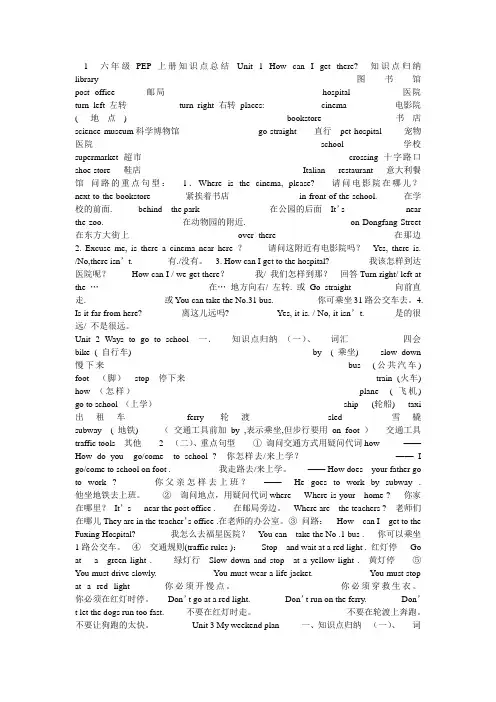
1 六年级PEP上册知识点总结Unit 1 How can I get there? 知识点归纳library 图书馆post office 邮局hospital 医院turn left 左转turn right 右转places: cinema 电影院( 地点) bookstore 书店science museum科学博物馆go straight 直行pet hospital 宠物医院school 学校supermarket 超市crossing 十字路口shoe store 鞋店Italian restaurant 意大利餐馆问路的重点句型:1.Where is the cinema, please? 请问电影院在哪儿?next to the bookstore 紧挨着书店in front of the school. 在学校的前面. behind the park 在公园的后面It’s near the zoo. 在动物园的附近. on Dongfang Street 在东方大街上over there 在那边2. Excuse me, is there a cinema near here ?请问这附近有电影院吗?Yes, there is. /No,there isn’t. 有./没有。
3. How can I get to the hospital? 我该怎样到达医院呢?How can I / we get there?我/ 我们怎样到那?回答Turn right/ left at the …在…地方向右/ 左转. 或Go straight 向前直走. 或You can take the No.31 bus. 你可乘坐31路公交车去。
4. Is it far from here? 离这儿远吗? Yes, it is. / No, it isn’t. 是的很远/ 不是很远。
Unit 2 Ways to go to school 一.知识点归纳(一)、词汇四会bike ( 自行车) by ( 乘坐) slow down 慢下来bus (公共汽车) foot (脚)stop 停下来train (火车) how (怎样)plane ( 飞机) go to school (上学)ship (轮船) taxi 出租车ferry 轮渡sled 雪橇subway ( 地铁) (交通工具前加by ,表示乘坐,但步行要用on foot )交通工具traffic tools 其他 2 (二)、重点句型①询问交通方式用疑问代词how ——How do you go/come to school ? 你怎样去/来上学?——I go/come to school on foot . 我走路去/来上学。
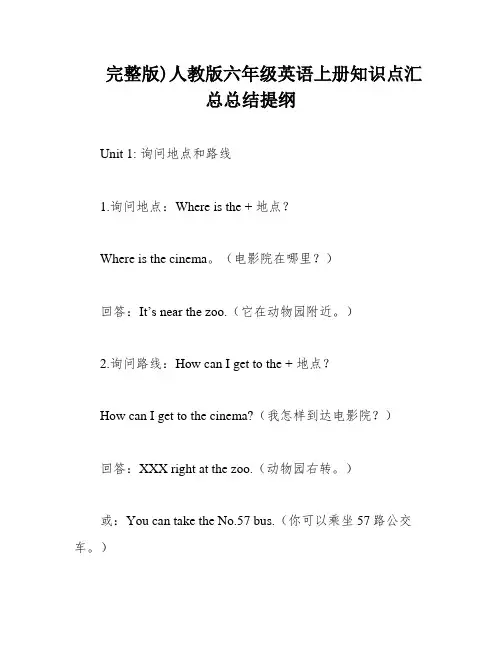
完整版)人教版六年级英语上册知识点汇总总结提纲Unit 1: 询问地点和路线1.询问地点:Where is the + 地点?Where is the cinema。
(电影院在哪里?)回答:It’s near the zoo.(它在动物园附近。
)2.询问路线:How can I get to the + 地点?How can I get to the cinema?(我怎样到达电影院?)回答:XXX right at the zoo.(动物园右转。
)或:You can take the No.57 bus.(你可以乘坐57路公交车。
)Unit 2: 交通方式1.询问某人怎样去某地:How do某人go(come) to + 地点?How do you go to school?(你怎么去学校?)回答:I go to school on foot.(我走路去学校。
)2.规定某人必须做某事:某人 + must + 动词原形XXX.(骑自行车的人必须戴头盔。
)I must pay n to the traffic XXX.(我必须注意交通信号灯。
)Unit 3: 打算做某事某人 + be going to + do(动词原形)She is going to see a film.(她打算去看电影。
)My uncle is planningXXX to go to the supermarket。
In this unit。
there are several types of ns that we can use to XXX。
For example。
we can ask "What are you going to do (+time or place)?" or "When are you going (+place)?" to get an XXX may include phrases such as "I am going to the cinema tomorrow" or "They are going to Nanjing next week."Similarly。
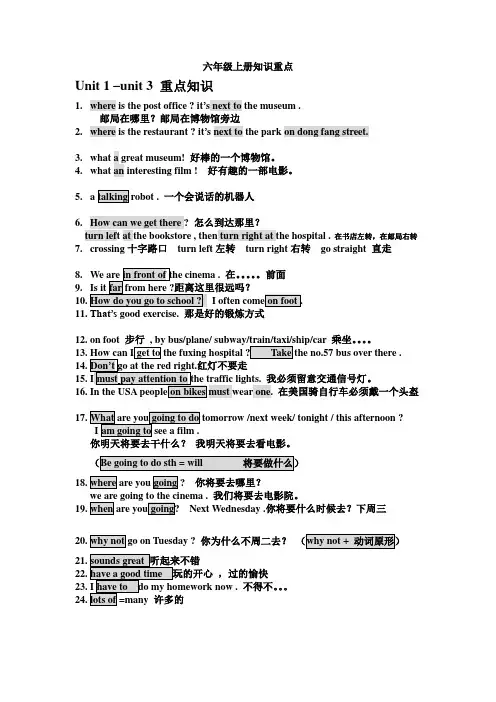
六年级上册知识重点Unit 1 –unit 3 重点知识1.where is the post office ? it’s next to the museum .邮局在哪里?邮局在博物馆旁边2.where is the restaurant ? it’s next to the park on dong fang street.3.what a great museum! 好棒的一个博物馆。
4.what an interesting film ! 好有趣的一部电影。
5.一个会说话的机器人6.How can we get there ? 怎么到达那里?turn left at the bookstore , then turn right at the hospital .在书店左转,在邮局右转7.crossing十字路口turn left左转turn right右转go straight 直走8.在。
前面9.10.11.12.乘坐。
13.14.15.I must pay attention to the traffic lights. 我必须留意交通信号灯。
16.In the USA people on bikes must wear one. 在美国骑自行车必须戴一个头盔17.18.你将要去哪里?我们将要去电影院。
19.Next Wednesday .你将要什么时候去?下周三20.你为什么不周二去?21.22.,过的愉快23.不得不。
24.unit 4-unit6 重点知识25.what are your his/her hobbies ?26.练习功夫27.28.中国歌曲Chinese song 好主意good idea 很有趣that’s interesting29.He lives on a farm.30.31.32.33.go—likes34.他/35.(同义句36.,I want to be a businessman .37.他在海上工作。
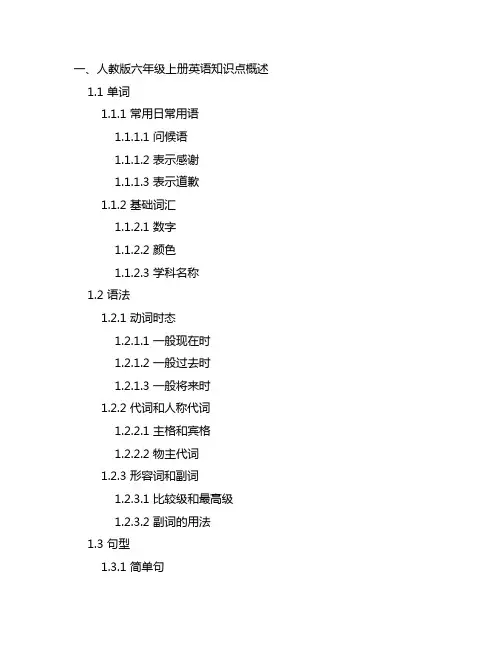
一、人教版六年级上册英语知识点概述1.1 单词1.1.1 常用日常用语1.1.1.1 问候语1.1.1.2 表示感谢1.1.1.3 表示道歉1.1.2 基础词汇1.1.2.1 数字1.1.2.2 颜色1.1.2.3 学科名称1.2 语法1.2.1 动词时态1.2.1.1 一般现在时1.2.1.2 一般过去时1.2.1.3 一般将来时1.2.2 代词和人称代词1.2.2.1 主格和宾格1.2.2.2 物主代词1.2.3 形容词和副词1.2.3.1 比较级和最高级1.2.3.2 副词的用法1.3 句型1.3.1 简单句1.3.1.1 肯定句1.3.1.2 否定句1.3.1.3 疑问句1.3.2 复合句1.3.2.1 并列句1.3.2.2 定语从句1.3.2.3 状语从句二、人教版六年级上册英语知识点详解2.1 单词2.1.1 常用日常用语2.1.1.1 问候语问候语是指在英语日常交际中用于打招呼和示好的常用词汇,包括Hello、Hi、Good morning、Good afternoon等等。
2.1.1.2 表示感谢表示感谢的常用词汇有Thank you、Thanks a lot、Thank you very much等,用于表达对别人的帮助或礼物表示感激之情。
2.1.1.3 表示道歉表示道歉的词汇包括I'm sorry、Excuse me、Pardon等,在日常生活中,用于向别人道歉或请求对方让步的场合。
2.1.2 基础词汇2.1.2.1 数字数字是英语基础词汇的重要部分,包括基本的数字表达方式和计量单位,如one、two、three等,以及hundred、thousand等。
2.1.2.2 颜色颜色是描述事物外观的重要词汇,在日常交流中也经常用到,包括red、blue、yellow等常见颜色词汇。
2.1.2.3 学科名称学科名称涉及到人们日常生活和学习工作的方方面面,包括mathematics、music、art等,是学习英语时必须掌握的词汇。
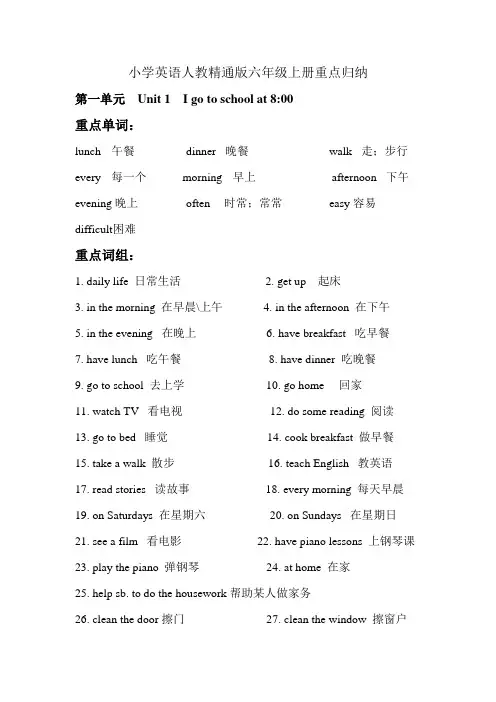
小学英语人教精通版六年级上册重点归纳第一单元Unit 1 I go to school at 8:00重点单词:lunch 午餐dinner 晚餐walk 走;步行every 每一个morning 早上afternoon 下午evening 晚上often 时常;常常easy 容易difficult困难重点词组:1. daily life 日常生活2. get up 起床3. in the morning 在早晨\上午4. in the afternoon 在下午5. in the evening 在晚上6. have breakfast 吃早餐7. have lunch 吃午餐8. have dinner 吃晚餐9. go to school 去上学10. go home 回家11. watch TV 看电视12. do some reading 阅读13. go to bed 睡觉14. cook breakfast 做早餐15. take a walk 散步16. teach English 教英语17. read stories 读故事18. every morning 每天早晨19. on Saturdays 在星期六20. on Sundays 在星期日21. see a film 看电影22. have piano lessons 上钢琴课23. play the piano 弹钢琴24. at home 在家25. help sb. to do the housework 帮助某人做家务26. clean the door 擦门27. clean the window 擦窗户28. clean the floor 擦地板重点句型:1.I don’t have breakfast at 7:00 in the morning . 我不是在早上七点钟吃早餐。
2.She gets up at 6:00 in the morning . 她在早上六点钟起床。
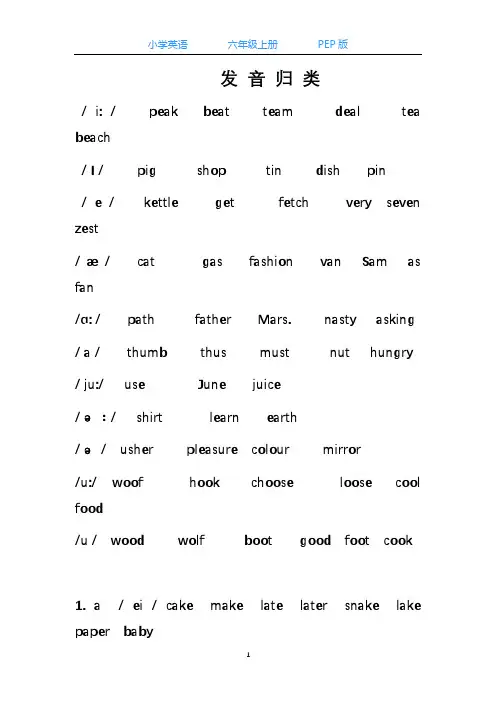
发音归类/ i: / peak beat team deal tea beach/ I / pig shop tin dish pin/ e / kettle get fetch very seven zest/ æ / cat gas fashion van Sam as fan/ɑ: / path father Mars. nasty asking / a / thumb thus must nut hungry / ju:/ use June juice/ ə:/ shirt learn earth/ ə / usher pleasure colour mirror/u:/ woof hook choose loose cool food/u / wood wolf boot good foot cook1. a / ei / cake make late later snake lake paper babya / æ /apple cat cap bag dad hat map black backa /ɑ:/ afternoon after banana dance lastclass glass grass grandma grandpa askfast fathera / ə/ china another woman breakfastaccountant bananaa / ɔ: / water a / ɒ/ watch wash want whata / i / orange2. e / i: / me he she these Chinese we returne / e / leg let bed pen desk yes egg3. i / ai / like kite bike drive time findlibrary excitedi / i / little fish big drink sit milk swimdig sister4. o / əu / Coke nose those close go homeno clotheso / ɒ/ lot dog holiday clock not boxodds hobby pot5. u / ju:/ use student cute excuse duty Tuesdayu / a / usher cut nut but bus cupjump much funnyu / ʊ / putu /u:/ June blue ruler superu / i / busy6. ea / i: / tea eat teacher please ice-creampeach jeans sneakers read meal beansclean season speak leaf leave(s) meaneast teach cleaner stream each sealseat beat wheatea / e / bread breakfast weatherea / ei / great7. ee /i:/ meet green three thirteen jeepqueen canteen sheep sweet beef weekend Halloween tree sleep need week feel seed deep between feet8. ow / au / brown how wow cow flowerdown now town crown shower ow / əu / yellow rainbow window snowy snow snowman know tomorrowrow show grow9. ou / au / mouth mouse out house ourplayground cloudy sour houseworkcloud about mountain southaccountant sprout loudou / u: / group soup coup10. th / ð / the this that these those fathermother brother with grandfathergrandmother clothes they themweather there either then othertogether anotherth / ө/ thank mouth birthday threethirteen thirty fourth eighth ninthtenth eleventh twelfth pathtwentieth thin Thursday healthynorth south month think themethinner thing something bathroom一、辨音,划线部分读音相同的打√,不同的打×(8%)()1. A. teacher B. bread()2. A. train B. wait()3. A. climb B. subway()4. A like B. pig()5. A foot B school()6. A bus B usually( ) 7.A stop B go( ) B plane二、找出划线部分发音不同与其他三个的单词。
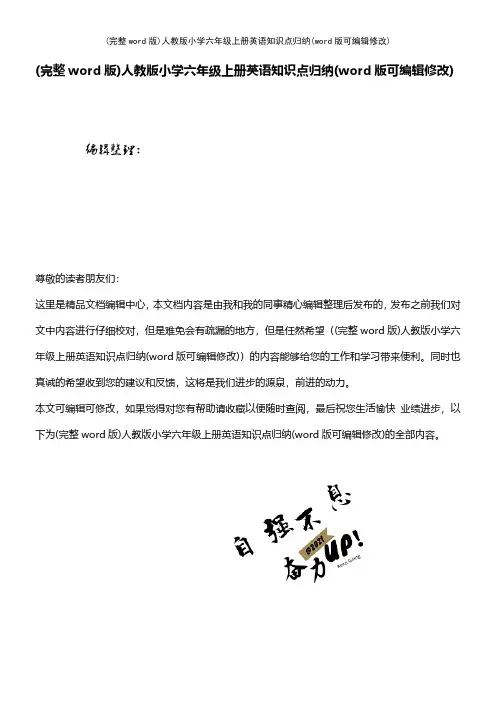

1 六年级PEP上册知识点总结Unit 1 How can I get there? 知识点归纳library 图书馆post office 邮局hospital 医院turn left 左转turn right 右转places: cinema 电影院( 地点) bookstore 书店science museum科学博物馆go straight 直行pet hospital 宠物医院school 学校supermarket 超市crossing 十字路口shoe store 鞋店Italian restaurant 意大利餐馆问路的重点句型:1.Where is the cinema, please? 请问电影院在哪儿?next to the bookstore 紧挨着书店in front of the school. 在学校的前面. behind the park 在公园的后面It’s near the zoo. 在动物园的附近. on Dongfang Street 在东方大街上over there 在那边2. Excuse me, is there a cinema near here ?请问这附近有电影院吗?Yes, there is. /No,there isn’t. 有./没有。
3. How can I get to the hospital? 我该怎样到达医院呢?How can I / we get there?我/ 我们怎样到那?回答Turn right/ left at the …在…地方向右/ 左转. 或Go straight 向前直走. 或You can take the No.31 bus. 你可乘坐31路公交车去。
4. Is it far from here? 离这儿远吗? Yes, it is. / No, it isn’t. 是的很远/ 不是很远。
Unit 2 Ways to go to school 一.知识点归纳(一)、词汇四会bike ( 自行车) by ( 乘坐) slow down 慢下来bus (公共汽车) foot (脚)stop 停下来train (火车) how (怎样)plane ( 飞机) go to school (上学)ship (轮船) taxi 出租车ferry 轮渡sled 雪橇subway ( 地铁) (交通工具前加by ,表示乘坐,但步行要用on foot )交通工具traffic tools 其他 2 (二)、重点句型①询问交通方式用疑问代词how ——How do you go/come to school ? 你怎样去/来上学?——I go/come to school on foot . 我走路去/来上学。
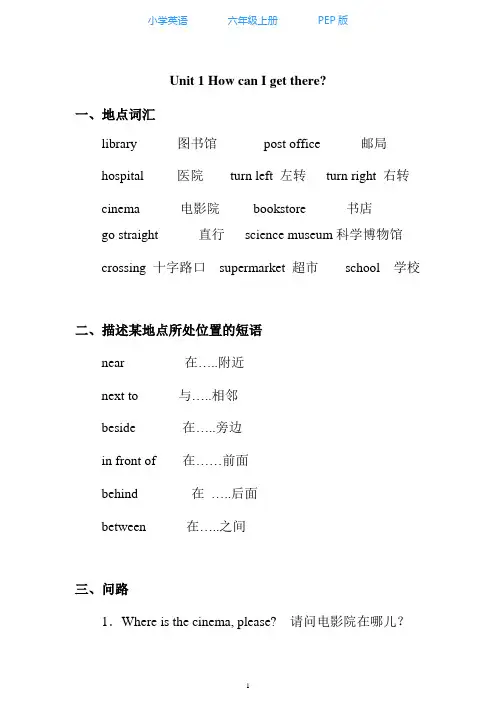
小学英语 六年级上册 PEP版 1 Unit 1 How can I get there? 一、地点词汇 library 图书馆 post office 邮局 hospital 医院 turn left 左转 turn right 右转 cinema 电影院 bookstore 书店 go straight 直行 science museum科学博物馆
crossing 十字路口 supermarket 超市 school 学校
二、描述某地点所处位置的短语 near 在…..附近 next to 与…..相邻 beside 在…..旁边 in front of 在……前面 behind 在 …..后面 between 在…..之间
三、问路 1.Where is the cinema, please? 请问电影院在哪儿? 小学英语 六年级上册 PEP版 1 next to the hospital. 在医院的旁边。 in front of the school.在学校的前面. It’s behind the park . near the zoo. 在动物园的附近. far from here. 离这儿很远.
2. Excuse me, is there a cinema near here. 请问这附近有电影院吗? Yes, there is. /No,there isn’t.有./没有。
3. How can I/we get there? 我怎样到那儿? Turn left at the bookstore. 到书店左转
4. How can I get to the hospital? 我该怎样到达医院呢? Take the No.57 bus. 乘坐第57路公汽。 By the No. 57 bus. 小学英语 六年级上册 PEP版
1 注意:到那儿 get there到某地 get to Canada/Australia/Beijing/ Shanghai/Wuhan get to the hospital/zoo/bookstore

人教版六年级英语上册各单元知识点汇总Unit 1 How can I get there?重点词汇:hospital 医院 cinema 电影院post office 邮局 bookstore 书店museum 博物馆 go straight 直走turn right 右转 turn left 左转crossing 十字路口 science 科学turn 转弯 left 左straight 笔直地 right 右重点句型:1. —Where is the...? ……在哪里?—It's near/next to the...它在……附近/ 与……相邻。
2.How can I get to the...?我怎么去……?3.Turn right./Turn left./Go straight.右转。
/左转。
/直走。
问(ask)路和指(tell)路英语中常见问路的表达方法:Excuse me, where is+地点, please?Excuse me, how can I get to+地点?Excuse me, can you tell me where+地点+is?英语中常见指路的表达方法:It's+表示位置的短语.Turn left/right at+地点.Go straight along+地点.常见的方位介词及短语:1. in表示“在……里面”。
2. on表示“在……上面”,但两者互相接触。
3. under表示“在……下方”。
4. behind表示“在……后面”。
5. in front of表示“在……前面”,正好与behind相反。
6. beside 表示“在……旁边”。
7. above 表示“在……上面”,但两者不接触。
8. between 表示“在……中间”。
9. near表示“在……附近”。
10. next to 表示“在……附近”,相当于near。
11. in the middle of 表示“在......中间”12.over在……上面;从……上方;穿越;over there在那里Unit 2 Ways to go to school重点词汇:bus 公共汽车 plane 飞机taxi 出租汽车 ship (大)船subway 地铁 train 火车by (表示方式)乘 on foot 不行stop 停下 slow 慢的down 减少;降低 slow down 慢下来重点句型:1.How do you get to...? 你怎么去……?2.I usually/often/sometimes come to school on foot/by...我通常/经常/有时候步行/乘……来学校。

小学英语人教精通版六年级上册重点归纳第一单元Unit 1 I go to school at 8:00重点单词:lunch 午餐dinner 晚餐walk 走;步行every 每一个morning 早上afternoon 下午evening 晚上often 时常;常常easy 容易difficult困难重点词组:1. daily life 日常生活2. get up 起床3. in the morning 在早晨\上午4. in the afternoon 在下午5. in the evening 在晚上6. have breakfast 吃早餐7. have lunch 吃午餐8. have dinner 吃晚餐9. go to school 去上学10. go home 回家11. watch TV 看电视12. do some reading 阅读13. go to bed 睡觉14. cook breakfast 做早餐15. take a walk 散步16. teach English 教英语17. read stories 读故事18. every morning 每天早晨19. on Saturdays 在星期六20. on Sundays 在星期日21. see a film 看电影22. have piano lessons 上钢琴课23. play the piano 弹钢琴24. at home 在家25. help sb. to do the housework 帮助某人做家务26. clean the door 擦门27. clean the window 擦窗户28. clean the floor 擦地板重点句型:1.I don’t have breakfast at 7:00 in the morning . 我不是在早上七点钟吃早餐。
2.She gets up at 6:00 in the morning . 她在早上六点钟起床。
小学英语人教精通版六年级上册重点归纳第一单元Unit 1 I go to school at 8:00重点单词:lunch 午餐dinner 晚餐walk 走;步行every 每一个morning 早上afternoon 下午evening 晚上often 时常;常常easy 容易difficult困难重点词组:1. daily life 日常生活2. get up 起床3. in the morning 在早晨\上午4. in the afternoon 在下午5. in the evening 在晚上6. have breakfast 吃早餐7. have lunch 吃午餐8. have dinner 吃晚餐9. go to school 去上学10. go home 回家11. watch TV 看电视12. do some reading 阅读13. go to bed 睡觉14. cook breakfast 做早餐15. take a walk 散步16. teach English 教英语17. read stories 读故事18. every morning 每天早晨19. on Saturdays 在星期六20. on Sundays 在星期日21. see a film 看电影22. have piano lessons 上钢琴课23. play the piano 弹钢琴24. at home 在家25. help sb. to do the housework 帮助某人做家务26. clean the door 擦门27. clean the window 擦窗户28. clean the floor 擦地板重点句型:1.I don’t have breakfast at 7:00 in the morning . 我不是在早上七点钟吃早餐。
2.She gets up at 6:00 in the morning . 她在早上六点钟起床。
Unit1 How can I get there?一.重点science museum科学博物post office 局bookstore 店cinema影院hospital医院crossing 十字路口二.重点near=next to凑近in front of在⋯⋯前面turn left向走turn right向右go straight 直走三.重点句子(1〕--Where is the post office?局在哪里?--It ’s next to the museum它.凑近博物。
(2〕I want to buy a postcard. 我想要一明信片。
(3〕What a great museum! 多么棒的博物呀!(4〕There is a pet hospital in my city. 在我的城市里有一家物医院。
(5〕What an interesting film! 多么幽默的影呀!(6〕--How can I get there?我怎到达那处?--Turn left at the bookstore. Then turn right at the hospital.在店的候向左。
尔后在医院的候向右。
(7〕We are in front of the cinema我.在影院的前面。
(8〕Now we are behind the hospital. 在我在医院的后边。
(9〕Is it far from our school?它离我学校?(10〕Follow me, please! 跟着我!Unit2 Ways to go to school.一.重点词组walk=on foot步行by bus乘公共汽车by plane乘飞机by train乘火车by taxi乘出租车by ship 乘轮船by subway乘地铁slow down 减速二.重点句子(1〕--How do you come to school?你怎样来学校?--Usually I come on foot. Sometimes I come by bus.平时我步行上学。
小学英语人教精通版六年级上册重点归纳第一单元u nit 1重点单词:lunch 午餐every 每一个evening 晚上difficult 困难重点词组:1. daily lite日常生活3. in the morning 在早晨上午5. in the evening 在晚上7. have lunch 吃午餐9. go to school 去上学11. watch TV 看电视13. go to bed 睡觉15. take a walk 散步17. read stories 读故事19. on Saturdays 在星期六21. see a film 看电影23. play the piano 弹钢琴2. get up 起床4. in the afternoon 在下午6. have breakfast 吃早餐8. have dinner 吃晚餐10. go home 回家12. do some reading 阅读14. cook breakfast 做早餐16. teach English 教英语18. every morning 每天早晨Igo to schoo lat 8 :00dinner晚餐morning 早上often 时常;常常walk走;步行afternoon 下午easy容易20. on Sundays在星期日22. have piano lessons 上车冈琴课24.at home 在家25.help sb. to do the housework 帮助某人做家务28. clean the floor 擦地板重点句型:1.1 don, thave breakfast at 7:00 in the morning ,我不是在早上七点钟吃早餐.2.She gets up at 6:00 in the morning 她.在早上六点钟起床.3.She doesn? tget up at 6:30 in the morning .她不是在早上6:30 起床.4.What does Kate do on Saturdays?凯特在周六做什么?5.She usually plays the piano.她通常弹钢琴.6.1 have breakfast at 7:30.我在7:30 吃早饭.7.1 have lunch at 12:00.我在12:00 吃午饭.8.1 have dinner at 6:00.我在6:00 吃晚餐.9.What do you do on Saturdays?你在周六干什么?10.1 often go and see a film,我经常去看电影.第二单元Unit2 重点单词:open开;翻开map 土也图dad爸爸flower 花take拿;取baby婴儿重点词组:W hat's your hobby?hobby爱好box盒子mum妈妈drink 喝photo照片hungry饿的collect 收集colour颜色plant植物;种植tea茶kid小孩cry哭21. at night 在夜间重点句型:1. Whafsyour grandpa ^hobby?你爷爷的爱好是什么?2. His hobby is fishing .他的爱好是钓鱼.3. What are you interested in?你对什么感兴趣?4. I ^interested in taking photos .我对拍照感兴趣.5. What^your hobby?你的爱好是什么?6. My hobby is collecting maps.我的爱好是收集地图. 6. What'syour dad'shobby?你爸爸的爱好是什么?7. His hobby is planting flowers .他的爱好是种花.1. a new toy car 一辆新的玩具汽车2. have a look 看一看3. collect toy cars 收集玩具汽车 5. collect maps 收集地图 7. look at 看9. drink Chinese tea 喝中国茶 11. cook meals 做饭 13. make dolls 做布娃娃 15. take photos 照相 17. talk about 谈论 4. collect stamps 收集邮票 6. collect picture cards 收集卡片8. plant flowers 种花 10. go fishing 去钓鱼12. be interestedin …对 .... 感兴趣 14. play computer games 玩电脑游戏16. take good care of 照顾好 18. play basketball 打篮球 9. look for 寻找20. from ••,to …从 ... 至!]第三单兀 Unit 3 W ould you like to com e to m y b irthday party? 重点单词:ice cream 冰激凌 sure 当然重点词组:3. invitation card 邀请卡4. invite your friends to your party 邀请朋友参加聚会5. celebrate your birthday with your friends 与朋友庆祝生日6. give a birthday card to your friend 向朋友赠送生日贺卡1. What kind of cake would you like?你想要什么种类的蛋糕?2. I’dlike a heart -shaped cake ,我想要一个心形的蛋糕.3. How do they celebrate the birthday?他4]怎么庆祝生日的?je lly 果冻 time 时间 after ........... 后then 那时 me 我〔I 的宾格〕 bye 再见 kind 种类candy 糖果light 点燃1. birthday party 生日聚会2. after school 放学后7. star-shaped cake 星形蛋糕 9. fruit pie 水果派水果馅饼 11. sing the birthday song 唱生日歌 13. blow out the candles 吹蜡烛 15. eat the cake 吃蛋糕重点句型:8. heart-shaped cake 心形蛋糕 10. light the candles 点蜡烛12. make a wish 许愿 14. cut the cake 切蛋糕 16. a piece of cake 一块蛋糕4. First, they light the candles and then 首先,他们点燃蜡烛,然后 …5. Would you like to come to my birthday party?你愿意来我的生日 晚会吗?6. Sure. I Jdlove to .当然,我愿意. 7. Good bye !/Bye-bye !/Bye!再见.8. Can I have some ice cream ?我能吃些冰激凌吗? 9. Here^abirthday cake for you .这个生日蛋糕是送给你的. 10. invite your friends to your party 邀请你的朋友到你的晚会11. celebrate your birthday with your friends 和你的朋友一起庆祝你 的生日12. give a birthday card to your friend 把这个生日卡片给你朋友第四单元 U nit 4 January is the firstm onth 重点单词:重点词组:Easter 复活节 January 一月February 二月 Back 回原处;后面 their 他〔她、它〕们的 March 三月 April 四月 tree 树;树木 Stop 〔使〕停止June 六月 egg 蛋;卵grass 草;草地 May 五月1.the first month of the year 一年里的第一个月2. the second month of the year 一年里的第二个月11. the third month of the year 一年里的第三个月 12. the fourth month of the year 一年里的第四个月 13. the fifth month of the year 一年里的第五个月 14. the sixth month of the year 一年里的第六个月 16. in the south of China 在中国南方1. January is the first month of the year .一月 份是一年中的第一个月.2. February is the second month of the year 二.月份是——年中 的第二 个月.3. March is the third month of the year .三月份是一年中的第三个月.4. April is the fourth month of the year.四月份是一年中的第四个月.5. May is the fifth month of the year .五月份是一年中的第五个月.6. June is the sixth month of the year 六.月份是一年中的第六个月.3 .New Year ' sDay 新年 5 .Tree Planting Day 植树节 7 .Mother ' sDay 母亲节 9. Father ' sDay 父亲节4. Spring Festival 春节 6. Labor Day \May Day 劳动节 8. Children ' sDay JL 童节 10. plant trees 植树17. all the day 一整天18. in March 在三月19. take a photo 照相20. go on a trip 旅行 15. go back home 回家1. the seventh month of the year 一年里的第七个月2. July 1st 七月一日3. the Communist Party of China 中国共产党4. Party members 党员5. the eighth month of the year 一年里的第八个月14. the ninth month of the year 一年里的第九个月 15. go back to school 回到学校16. Santa Claus 圣诞老人17. the tenth month of the year 一年里的第十个月 18. the eleventh month of the year 一年里的第H —^个月 19. the tweIfth month of the year 一年里的第十二个月重点句型:第五单元 Unit5 重点单词:Chris tmas 圣诞节 Month 月 October 十月重点词组:July is the seventh m on thJuly “匕月 year 年 November H —kAugust 八月 September 九月 December 十二月6. Amy Day 建军节 8. Teachers Day'教师节 10. on August 1st 在八月一日12. summer holidays 暑假7. National Day 国庆节 9. Thanksgiving Day 感恩节 11. in August 在八月13. the party ' sbirthday 党的生日1.July is the seventh month of the year 七.月是一年中的第七个月.2.August is the eighth month of the year.八月是一年中的第八个月.3.September is the ninth month of the year 九.月份是一年中的第九个月4.October is the tenth month of the year.十月份是一年中的第十个月5.November is the eleventh month of the year 十.——月份是——年中的第十一个月.6.December is the twelfth month of the year.十二月份是一年中的第十二个月.11. Christmas 圣诞节21.December is the last .十二月份是最后一个.22.month of the year 一年中的月份第六单兀U n it 6 There are four seasons in a year重点单词:Season季节Green绿色〔的〕Begin开始Weather 天气Autumn秋天brown棕色〔的〕spring春天bird 鸟close关;关闭heavy重的winter冬天Httle小的fly飞summer夏天rain雨;下雨ye llow黄色〔的〕snowman 雪人重点词组:1. a lot of 许多,大量 3. form the land 耕地 5. fly kites 放风筝7. go to a summer camp 去夏令营 8. have summer holidays 过暑假 9. go swimming 去游泳 11. cut rice 割稻子 13. sweep the snow 扫雪 15. have fun 玩得快乐17. celebrate Spring Festival 庆祝春节 18. play in the park 在公园里玩重点句型:1. What' sspring like?春天是什么样的?2. What do people do in spring?人们在春天做什么?3. Trees have new green leaves 树.木长着新的绿叶.4. There are a lot of flowers on the peach trees 在•桃树上有许多花.5. Birds sing to welcome the spring .鸟儿唱着歌迎接春天的到来.6. What do students do on summer holidays?学生们在暑假做什么?7. What do people do in autumn and winter?人们在秋天和冬天做什么2. wake up 醒来4. go on spring outings 去春游 6. go on a trip 去旅游10. pick apples 摘苹果 12. make a snowman 堆雪人 14. climb a tree 爬树 16. think of 思考19. go to the zoo 去动物园8.Spring is the first season .春天是第一个季节.语法点总结:一、基数词,序数词序数词前一定要加“the序〞,数词一般用于:①日期【the号(序数词)of月】the 8th of July七月八号②【第几…】the 15thl fifteenth第十五号③【名次】the fifteenth第十五名二、动词1. be动词原型(am/is/are ) be动词过去式(wasl were )I am wasHe/she/it is wasWe/you/they are were三、介词①in+月、年the morning/afternoon/evening/a week表示时间②on+具体某一天(几月几日)/某个假期(…Day )③at+具体某点时间、某个假期(…Festival) /the weekend①in …street 表示方位(2)on, - ,road/left/right(3)at the…crossing/stop/某个具体的地点①in the tree(不是树上长出来的),比方:Bird in the tree②on the tree(树上原来自己长出来的)比方:Apple on the tree表示时间:①ago( ............ 以前) later( ................ 以后)②before (在以刖〕after〔在 .. 以后〕四、名词(1)不可数名词:bread, juice, tea, coffee, water, chocolate, rice, paper(不可数名词相对应的be动词永远都是is/was)2、名词复数规那么(1 ). 一般情况下,直接加-s ,如:book-books, bag-bags, cat-cats, bed-beds(2).以s. x. sh. ch 结尾,加-es ,如:bus-buses, box-boxes, brush-brushes, watch-watches(3).以“辅音字母+y〞结尾,变y为i,再力口-es , 如:family-families, strawberry-strawbemes(4).以“f 或fe 〞结尾,变f 或fe 为v,再加-es ,如:knife-knives(5)不规那么名词复数:man ---men, woman---women, policeman---policemen, policewoman--- p olicewomen, mouse---mice child---children foot---feet,.tooth---teeth fish---fish, people---people, Chinese---Chinese, Japanese---Japanese 1.主格一般用在句中作为主语,一般用在动词前(除疑问句) 2.宾格多用于动词介词后面.3.形容词性物主代词后面必须要跟名词.4.名次性物主代词二形容词性物主代词+名词六、形容词及副词的比拟级1. 形容词比拟级用于两者比拟,根本句式为:〔A〕主格+ bel+形容词比拟级+ than+B〔宾格〕.2.副词比拟级根本句式为:〔A〕主格+动词1+副词比拟级+ than+B〔宾格〕o3.比拟级的用法:①一般+ er②双写最后一个字母+ er ,如thin—thinner,big—bigger,fat—fatter,hot—hotter,③不规那么的比拟级:good/well-bette r,many/much—more,far-farther/further4.一样的情况用as…as,句式为:as原级as5.注意:too,very+原级七、动词时态:一般现在时Be型:I用am, you用are, is连着他她它洋数is,复数are.变否认很简单,be动词后加not,变疑问,更容易,动词往句首提.一二人称要互换, 句末问号莫丢弃,否认疑问任你变,句首大写莫忘记.Do型:一般现在时很简单,主语总是加动原;除非主语是三单,三单动词有变化;变否认,找动词,动原前面加don't;动词三单加doesn'后t,面动词改原形;变疑问,找动词,动原句首加上do;如果动词是三单,助动词does句首请;主语紧随在其后,动词改原形莫迟疑.动词第三人称单数变化:①be的第一人称单数形式为am,第三人称单数形式为is,其他人称形式为are.②have的三人称单数为has.③一般动词三人称单数形式是在动词原形后加s或es.加-es的动词规贝IJ(注意:名词变复数也是加s或es):①在动词后加s②以s、x、ch> sh结尾的词,假设发噬音就加es③以"辅音+o"结尾的词要加"es如",goes, does, potatoes;以“元音+.〞结尾的词,直接加s.④局部以f或fe结尾的名词变复数时要将f变v再加“ es〞,如knife (knives),wife (wive s)一般过去时:主语+动词过去式+表过去的时间What did +do+过去时间?Did +主语+动词原形+过去时间?动词过去式变化规那么:规那么变化:①一般在动词原形末尾加ed②词尾e的动词加d③末尾只有一个辅音字母的重读闭音节,先双写这个辅音字母,再加ed④结尾是“辅音字母+y〞的动词变y为I,再加ed,如studied.结尾是" 元音+y〞的动词直接加ed,如played.动词过去式+ed的读音:①在浊辅音和元音后/d/②在清辅音后面/t/③在/t/ /d/的音后面发/id/一些不规那么动词的变化:am, is (was); are (were); have, has (had); go (went); eat (ate) buy (bought); do (did); ski (skied); make (made) see (saw) leave (left) take (took) stu dy (studied) swim (swam) sing(sang)一般过去时态如何将肯定句变成一般疑问句?①一种是有be动词的,即有was或were,只要把was或were提到句首,把句中第一人称转为第二人称,即I, we变you, my和our变your, 然后把句中剩下的单词依次抄下来.如:It was a windy day.-Was it a windy day?That was my bag.---Was that your bag?②另一种是无be动词的句子,需要助动词来帮助.把过去时态的助动词did放在句首,把第一人称改为第二人称,然后把剩下的句子依次抄下来,在抄的过程中,要把动词的过去时转变成原形.如I went fishing yesterday.-Did you go fishing yesterday?例题:按要求改写以下句子John washed the clothes last weekend.What did John do last weekend?〔对划线局部提问〕John didn ' twash the clothes last weekend.否〔定句〕Did John wash the clothes last weekend?〔一般疑问句〕Yes, he did.〔肯定答复〕No, he didn 〔t 否.定答复〕一般将来时:①主语+be going to+动词原形〔或地点〕+表将来的时间②shall, will 表将来的句子例句:You wiU like it.你将会喜欢它.I ' ingoing to be an English teacher.我〔想成为一名英语老师〕例题练习:I am going to vis it my grandparents this weekend.对划线局部提问:When are you going to visit your grandparents ?否认句:I am not going to vis it my grandparents this weekend.——般疑问句:Are you going to vis it your grandparents this weekend? 肯定答复:Yes, I am.否认答复:No, I am not.一般现在进行时:〔指在某个时刻正在进行某个动作或从事某项活动〕句式:主语+be+动词现在分词例题练习:I ' mdrawing pictures with my friend.对划线局部提问What are you doing with your friend?否认句:I' mnot drawing pictures with my friend.一般疑问句Are you drawing pictures with your friend?肯定答复:Yes, I am.否认答复:No, I am not.特殊疑问词:what什么where哪里who谁whose谁的when什么时候how怎样which哪一个why为什么what color什么颜色what class 什么how many 多少how long多长时间how heavy 多重what day星期几what time什么时候what season 什么季节how much多少钱how old多大what date 日期what subject什么科目what animal什么动物how often多经常how tall 多高。
小学六年级英语(上册)知识归纳|人教版Unit 1 How do you go to school?一、重点短语:by plane 坐飞机by ship 坐轮船on foot步行by bike 骑自行车by bus 坐公共汽车by train 坐火车trafficlights交通灯traffic rules交通规则go to school 去上学get to 到达get on上车get off下车Stop at a red light. 红灯停Wait at ayellow light. 黄灯等Go at a green light. 绿灯行二、重点句型:1.How do you go to school?你怎么去上学?ually I go to school on foot. SometimesI go by bus.通常我步行去上学。
有时候骑自行车去。
3.How can I get to Zhongshan Park ?我怎么到达中山公园?4.You can go by the No. 15 bus. 你可以坐15路公共汽车去。
三、重点语法:1、There are many waysto go somewhere.到一个地方去有许多方法。
这里的ways一定要用复数。
因为there are是There be句型的复数形式。
2、on foot 步行乘坐其他交通工具大都可以用介词by…,但是步行只能用介词on 。
4、go to school的前面绝对不能加the,这里是固定搭配。
5、USA 和US 都是美国的意思。
另外America也是美国的意思。
6、go to the park 前面一定要加the. 如果要去的地方有具体的名字,就不能再加the ,如果要去的地方没有具体名字,都要在前面加the. (go to school除外。
)7、How do you go to …?你怎样到达某个地方?如果要问的是第三人称单数,则要用:How does he/she…go to …?8、反义词:get on(上车)---get off(下车)near(近的)—far(远的)fast(快的)—slow(慢的)because(因为)—why(为什么)same(相同的)—different(不同的)9、近义词:see you---goodbye sure---certainly---ofcourse10、频度副词:always 总是,一直usually 通常often经常sometimes 有时候never 从来不Unit 2 Where is the science museum?一、重点短语:library 图书馆post office 邮局hospital医院cinema 电影院bookstore书店science museum科学博物馆turnleft向左转turn right 向右转go straight 直行north北south南east东west西next to靠近、与……。
相邻then 然后二、重点句型:1.Where is the cinema,please?请问电影院在哪里?2.It’s next to thehospital. 它与医院相邻。
3.Turn left at the cinema,then gostraight. It’s on the left. 在电影院向左转,然后直行。
它在左边。
三、重点语法:1、问路时要用"excuse me对不起,打扰一下"2、描述路时可以用顺序词:first首先,next接着,then然后3、near 表示在附近,next to表示与…相邻。
它的范围比near小。
in front of 在。
前面behind 在……后面4、在左边,在右边介词要用on,on theleft/on the right,但是东西南北,介词要用in,in the north/east/south/west.5、for 表示持续多长时间,当表示做某事多长时间都要用for.? 如:Walk east for 5 minutes.?? Then walk straight for three minutes.6、乘几路车可以用by the No.301bus,注意No.中N要大写,后面要加点。
如果要用动词可以用take,例如take the No.301 bus.7、当表示某个地方在另一个地方的哪一方向时,要用介词of。
如:the hospital is east of the cinema. 医院在电影院的东边。
8、表示在哪儿转时,用介词at。
如:Turn left at thebank。
在银行左转。
9、find表示"找到",强调找的结果。
Lookfor表示"寻找",强调找的过程。
10、在几点前面要用介词at,如at 7p.m.11、英文的书信与中文的书信不完全一样:开头:英语是在人称后面加逗号,中文是加冒号。
正文:英语是空三个或者五个字母写,中文要空两个中文字格。
结尾:英语的落款与人名是顶格而且是分开写的。
中文则是另起一行,放在一起且稍靠后一点儿的地方。
英文名字的书写要注意下。
12、近义词:bookstore==bookshop 书店gostraight==go down直行afterschool==after class 放学后13、反义词或对应词:here (这里)---there(那里)east(东)---west(西)north(北)---south(南)left(左)---right(右)get on (上车)---getoff(下车)14、in the front of…表示在…的前面,是指在该地方的范围内,in front of而则表示在该地方的范围外。
如:in front of our classroom是指在教室的外面而且在教室的前面。
而inthe front of classroom则是指在教室里的前面。
15. be far from…表示离某地远。
be 可以是am ,is ,are.My home is not far from school.我家离学校不远。
Unit 3 What are you going to do ?一、重点短语:this morning 今天上午this afternoon 今天下午thisevening今天晚上next week 下周tomorrow 明天tonight 今晚post card 明信片comic book漫画书newspaper报纸二、重点句型:1.What are you going to do on the weekend?你周末打算做什么?2.I’m going to visit mygrandparents this weekend?这个周末我打算去看望我的外祖父母。
3.Where are you going this afternoon?你今天下午打算去哪里?4.I’m going to thebookstore.我打算去书店。
5.What are you going to buy?你打算去买什么?6.I’m going to buy a comicbook.我打算去买一本漫画书。
三、重点语法:1、What are you goingto do?你想做什么?询问他人在未来的打算。
be going to 后面要跟动词的原形。
注意be going to be 意思是"打算成为什么,干什么职业。
"注意一下句子的区别,找出正确回答。
What are yougoing to do this afternoon?What are you going tobuy?What are you going to be?When? are you going?Where are yougoing?Howareyougoing?Who are you going with?2、this evening 和tonight的区别:this evening指的是今天晚上睡觉以前的时间,一般指晚上十二点以前。
而tonight指的是今晚,一般是指一整晚的时间,通宵。
3、P30写周末的作文的模板4、部分疑问代词的意义与用法:(1)What 什么。
用来问是什么,做什么,叫什么,什么样等等。
如:What is your name? 你的名字叫什么?What is your father? 你爸爸是干什么的?What is your hobby?你的爱好是什么?What is your favourite food?你最喜爱的食物是什么?What's your math teacher like? 你的数学老师长得什么样子? (2)Where ,在哪里,到哪里。
用来问地点。
如:Where are you from?你从哪里来?Where are you going to ?你打算去哪里?Where is my ruler?我的尺子在哪里?(3)When,什么时候。
用来问时间。
如:When is your birthday? 你的生日是什么时候?When are you going to ?你打算什么时候去?When do you go to school?你什么时候去上学?(4)what time 几点了。
用来问具体的时间,如:What time is it? 现在几点了?(5)What colour什么颜色。
用来问物体的颜色。
如:What colour is your schoolbag?你的书包是什么颜色的?(6)What kind of 什么种类。
用来问类别。
如What kind of fruit do you like?你最喜欢哪一种水果?(7)who谁。
用来问人物是谁。
如:Who is your English teacher ?你的英语老师是谁?Who's that man? 那个男人是谁?(8) whose谁的。
用来问物体的主人是谁?如:Whose pencil is this? 这是谁的铅笔?Whose bike is blue? 谁的自行车是蓝色的?(9) which哪一个。
用来问具体的哪一个。
如:Which season do you like best?你最喜欢哪个季节?Which pencil is ken's? the long one or theshort one?哪只铅笔是Ken的?长的那支还是短的那支?(10)how怎样?用来问身体状况,或者事情的状况,对事件的看法等。